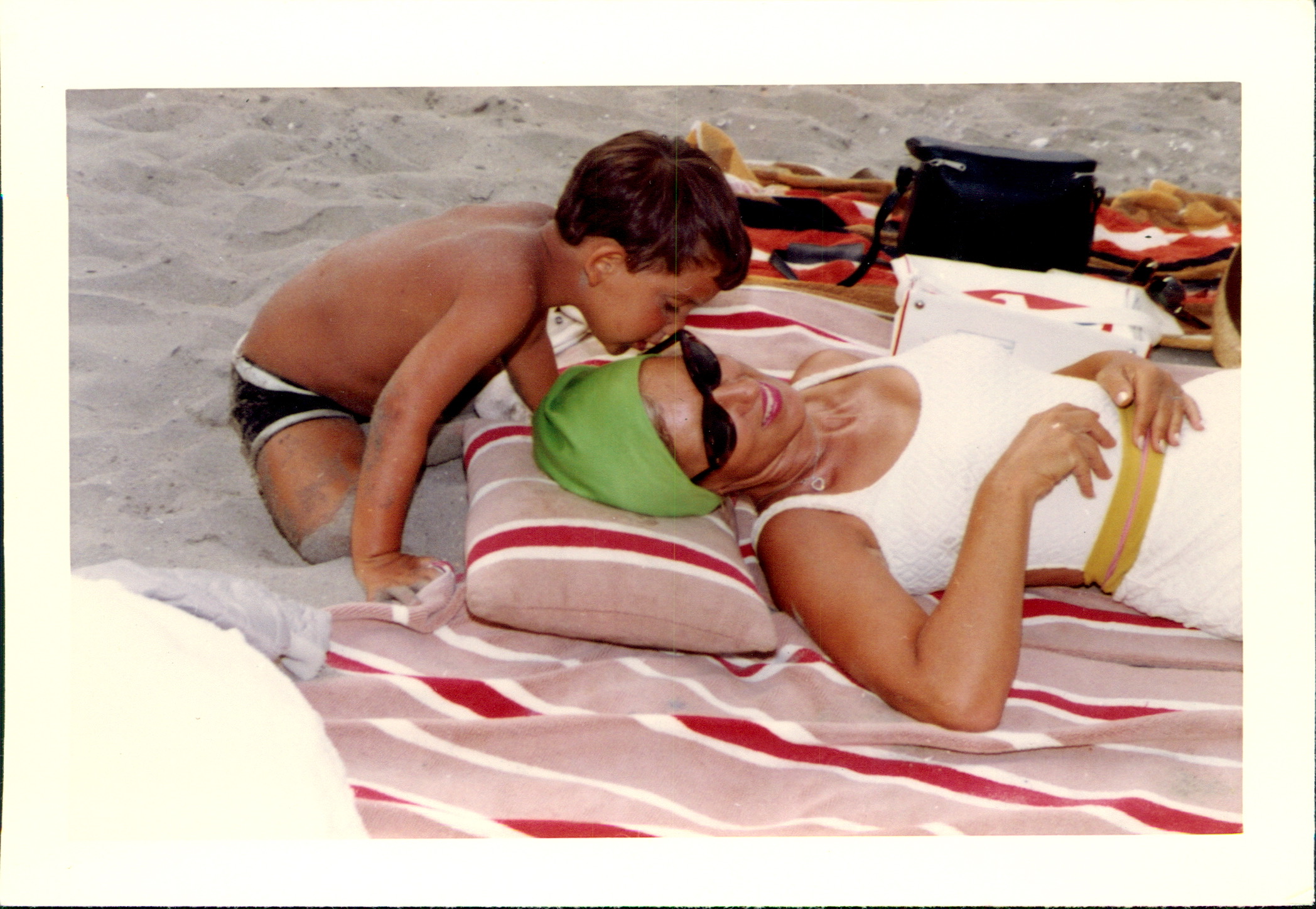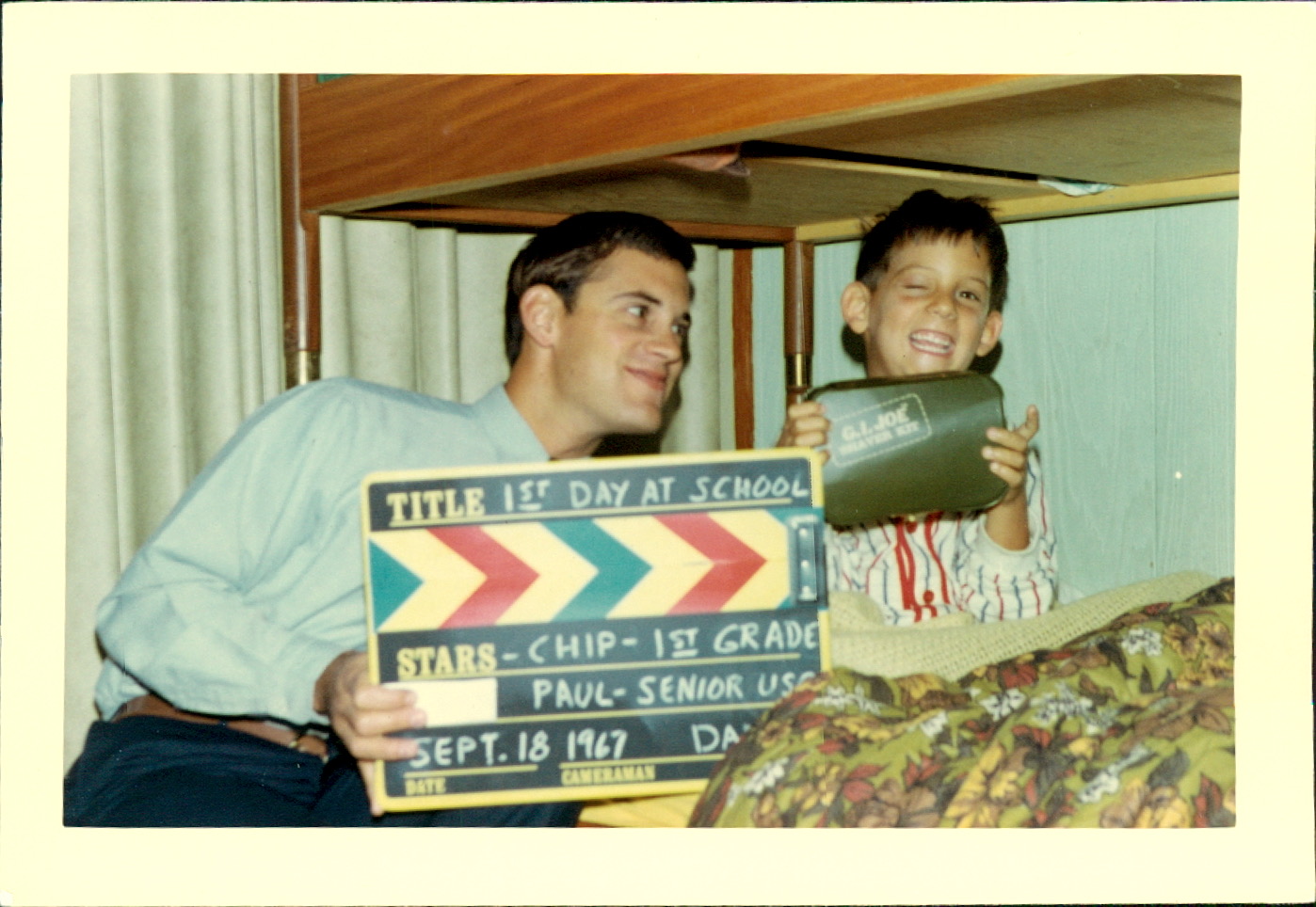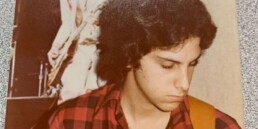The baseball cracked off the bat, vanishing into the smoggy, gray sky over east Pasadena’s Eugene Field Elementary School. Squinting and craning for it, I became a boy obsessed, a boy determined to make this pop-up fly ball his playground conquest. When the spinning white dot finally reappeared, growing in dimension every second, adrenaline was my master.
Only dibs needed to be called.
“I got it—I got it!” I hollered that day in 1970, waving my arms like I’d seen Los Angeles Dodgers centerfielder Willie Davis do frequently on TV.
Then again, he was a professional athlete who brandished a mitt. I was an impulsive third grader trying to grandstand for my recess chums by catching a high velocity object with my bare hands.
So, I got it all right—right in the bridge of my nose.
The wicked thump was a horse kick to the face. Seconds elapsed before I realized what’d happened, before I peered down at my T-shirt transmuting from lily-white cotton into an expanding Rorschach of bright red.
My nose wasn’t bleeding. It was an unstoppable faucet. I nearly fainted on the blacktop.
At the school infirmary, the nurse handed me a tissue to staunch the bleeding. Soon, I was in my mom’s pale-blue Ford Mustang, too shaken to guilt her into a therapeutic trip to Baskin Robbins for a double-scoop cone.
“Am I going to die?” I asked her, eyes normally full of mischief clouded with fear. “Do I still have enough blood in my body to live?”
“Don’t be silly,” she replied gently. “You just had a little accident.”
Little?

That night, in the lower berth of my cozy bunk bed, I shut my eyes, repeating her guarantee that I’d wake the next morning.
As it were, I wouldn’t sleep through the night.
When “it” happened, I wasn’t facing my turquoise-painted wall, which I normally did to avoid eyeballing the monsters—Dracula, Frankenstein, itinerant werewolves—that I sometimes imagined strolled past my bedroom. I was turned outward.
At roughly 2 a.m., an oval bubble of pristine, white-gold-ish light from the corner of the room summoned me out of a cavernous sleep. Or, more accurately, yanked me out of it.
Inside this sparkling incandescence unlike anything plugged into a socket was the bearded, blue-eyed figure that starred in children’s Bible books. The man in the light wore his customary garb—white robe, burgundy sash—and a penetrating expression of bottomless understanding. His sandaled feet levitated above the shag carpeting, which I’d stained endlessly with Welch’s Grape Juice and Elmer’s Glue. He bunched two raised fingers together. Peace.
I lifted myself off the pillow and blinked, certain I was dreaming. Strange. He was still there. I blinked again: He remained. I shook my head in a double-take simulation of cartoon characters shocked to their stenciled gourd.
Yet he remained, aglow for thirty-odd-seconds, with just my Bugs Bunny stuffed animal bearing witness. To this day, I remember how the spectacular light haloing him was bright without being blinding, alive and self-generated, its crystalline particles rotating in place like twinkling diamonds.
My pajama top beat to my sledgehammering chest as I galloped into my parent’s darkened bedroom, simultaneously ecstatic and petrified, after He dissolved. Deep down I knew that light was magical.
“Mom, mom!” I stuttered, rocking her motionless shoulder. “Jesus—he was in my room. Come look.”
Well, she didn’t. She grinned dopily, mumbling, “I believe you.”
After a comfort hug, she fell back to sleep, as if this presence warranted no urgent inquiry. Disappointed, I tiptoed back to my room, imploring my visitor that one trip tonight was enough for this boy.
But questions; yeah, I had a GI Joe lunchbox of them for my mom, an ex-beauty queen turned mercurial social butterfly and unflinching believer. How, I posed the next morning, did Jesus creep into our house? Where did he travel next? Did his robe have pockets? Could telescopes pinpoint his address?
Today, her answers escape me. I do recall her explicitly warning me not to spill a word to anyone, lest they misunderstand, or think I was a liar. Consider his appearance “a gift,” she advised.
“Why did he visit me?” I followed up. Why, after all, was my favorite word.
“You’ll discover that in due time,” she answered.
I must’ve been displeased by her vague explanation, because she volunteered her own ghost story. My jaw plopped open.
Days after her father’s untimely death (this, fourteen years before I was born), she claimed that he’d returned. As from beyond. She said that he roused her from the foot of her bed, engulfed in light, reassuring his heartbroken daughter all was well.
After another round of my rat-a-tat questions, she told me to go play.
Of course, I was an eight-year-old child digesting all this absent any context. I had little inkling then religion was emotional TNT between my mom and Caltech-educated atheist/agnostic father; that they coexisted in a prickly détente in which my two older brothers and I could celebrate Easter and Christmas so long as my mom didn’t flaunt their mystical underpinnings. Even brief mentions of our baptisms ignited closed-door shouting matches everyone could hear.
No wonder my mom taught me the Lord’s Prayer and Memorare at night in hushed tones.
It was my father to whom she hoped I’d never say anything about that night.
Restless curiosity propelled me through college, and then a career as a journalist, where I adored connecting dots and unearthing secrets.
As for my own one, I was circumspect but not silent about the man in the light. Over time, I confided my experience to a handful of people, especially when I believed they could use some inspirational nourishment. Most listened earnestly, courteously—before suggesting that my traumatized brain had conjured up a soothing, hologram Jesus. By this logic, evolution was to thank for what I saw in my room, not any creator psychically linked to his creations. Afterwards, I usually regretted saying a damn thing, identifying with folks in the same prickly limbo after encountering U.F.O.s or other supernatural events. We need, for ourselves and our moral latch on the world, to proclaim what happened, and yet to do so risks silent pity at best and outright mockery at worst.
A knee-jerk culture quick to slap scientific denunciations and Twitter memes on any phenomena that fails to reach its vague standards beats you into silence.
Over time, It left me wondering about delusion. Was it me, for recounting the moment that’s lost none of its vividness and beauty over the decades, or doubters who believe God is either a fairytale or a harried divinity with no time for a taxi-door-earred, little kid panicked about how much blood his anatomy could spare?
Lung cancer snatched my cigarette-puffing mom in 2008. My special-needs, middle brother, Peter, followed her unexpectedly in 2012. Their departures isolated me with my oldest brother, Paul, and a cantankerous, ailing father who saw light merely as measurable photons.
By now, I wasn’t the same Chip. I was riveted (okay, fixated) with seeing behind the earthly veil. Near-death experience, past-life memories, reincarnation; you name it I devoured books, articles, videos and whatnot chronicling them. I could dazzle you about the celestial odysseys of the clinically brain-dead, and the child who remembered dying near Japan as a U.S. pilot in World War II. My father, who had been scarred as a Depression-era child, had judged every bit hogwash.
My zeal about the blurry boundary between life and the afterlife continued to perplex my friends, who wondered if I was squirming with my own mortality—logic that periodically inhabited me, too.
That was before a fateful day in summer 2018.
At a family wedding, I found myself sitting in a pew next to a woman whom I hadn’t seen in years. Maria was the sweet, reserved wife of a handyman-carpenter who’d long worked for my father’s real estate business. Unprompted, she told me of an apparition. (Looking back, people always seems to be doing that.)
On the first anniversary of my father’s passing, at nearly ninety-eight, Maria claimed she’d had a barnburner of a dream. In it, my dad had reappeared before her, looking more vibrant than she’d ever seen him in this plain. The visiting entity asked her to deliver a message.
He wanted Maria to speak to Paul, who didn’t share my particular Eastern-influenced Christianity, and was more distraught by our father’s demise than me. Tell him not to anguish, our restored parent said, for he now lived not in an urn at Forest Lawn Cemetery but in a locale electric with spirits.

I asked Maria if her sleep visitor mentioned me. No, she said.
“That’s definitely my dad,” I replied with a teary chuckle. “Definitely.” Paul, still his favorite child, needed that consolation.
Before that day was over, I had my own awakening: what happened to me in 1970 wasn’t an aberration. It was part of an intriguing family club, where departed relatives visited the living in their dreams and darkened bedrooms.
It just so happened then—or was it?—I was writing my first novel, historical fiction swirling around construction of my hometown’s Colorado Street (aka “Suicide) Bridge during the Progressive Age. I decided the time had come for me to salt in what I learned that night. That there is no death—that the Grim Reaper isn’t as a collector of souls who takes one to extinction. He’s a corny, cloak-wearing fraud weaponized over the millennia by kings, popes, demagogues, and profiteers to keep the fearful masses under their thumbs. So, I took the plunge, filling Arroyo with a natty guardian angel and a clairvoyant dog. My main character, Nick Chance, must die in abject failure so he can live again to get it right.
I did it with the spirit of that cosmic light, because it wasn’t just for me. How selfish, how insecure—how cowardly—I’d been until to allow other people’s blinkered skepticism to keep me from heralding the “gift” that my mother told her wide-eyed boy he’d decipher someday. From now on, the spectral fireworks I felt in my heart, back in my bunk-bed days, will infuse everything I write. Everything I do.
The trajectory of that nose-smashing baseball wasn’t calculated in error.
Related Posts
The Tree and the Voice and Writing a Novel
"Later Days" began when a brilliant, dying friend asked me…
From the Department of Unexpected: “Later Days” Wins General Fiction Prize at the American Writing Awards!
And, in another humbling development, it was also named…
“The Lost Art of Album Release Parties” – Boomer magazine
We hustled into my room, nodding at the familiar, Jimmy…




